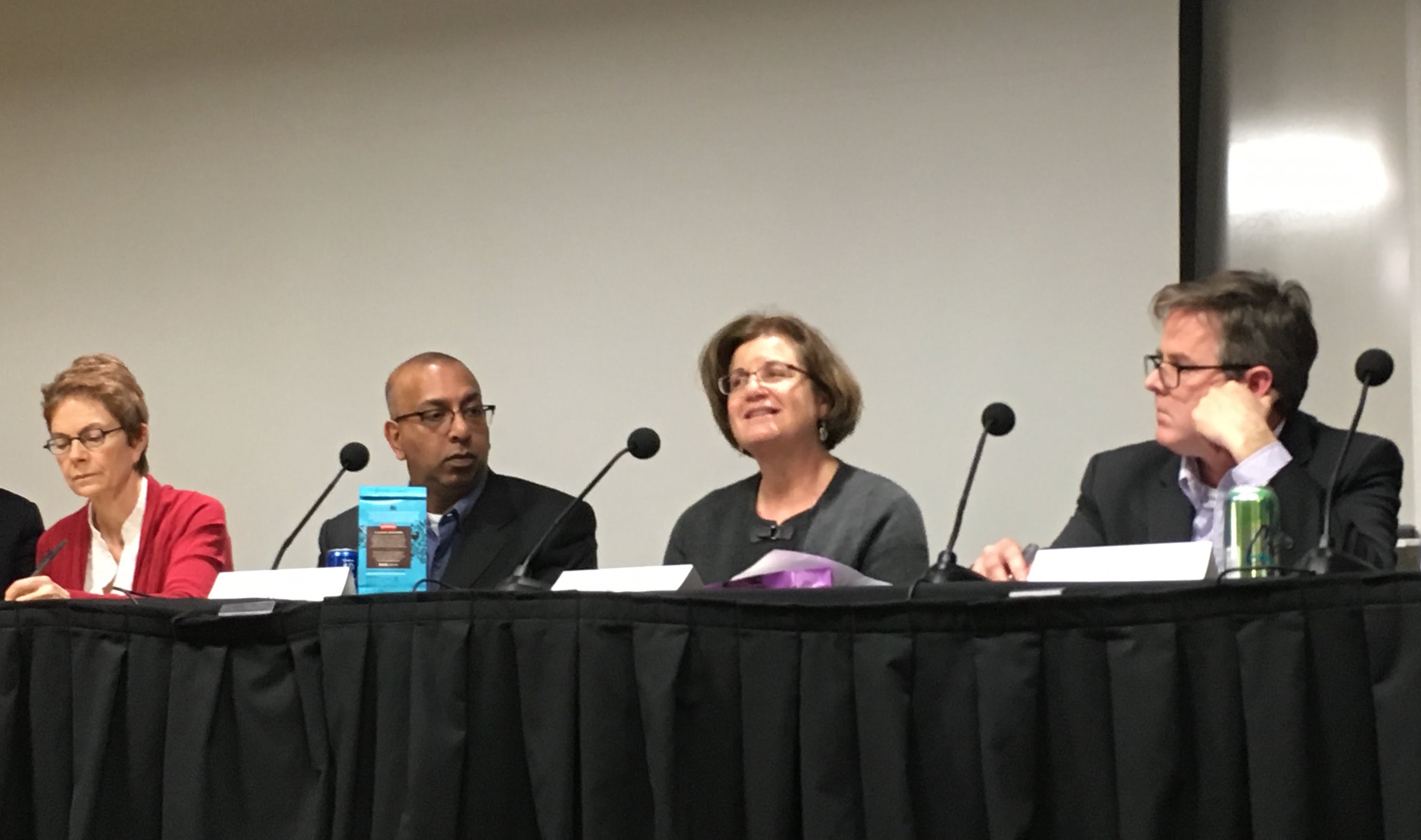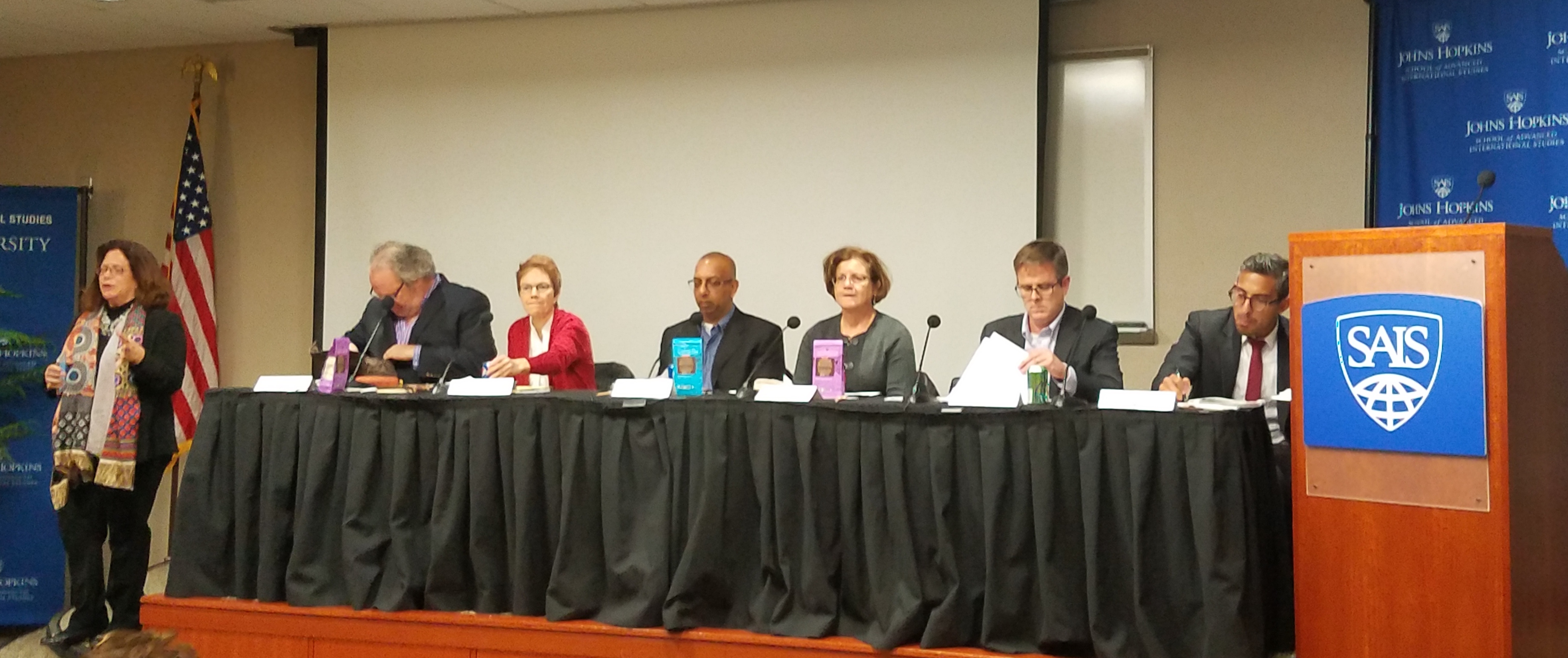Last month, MSI Integrity, the John Hopkins School of Advanced International Studies (SAIS), the International Human Rights Clinic at Harvard Law School, and Miller & Chevalier hosted the panel discussion, “MSIs Then and Now: What’s at Stake?” (video link).

The discussion was held at SAIS in Washington, D.C. and brought together MSI stakeholders, academics, and business and human rights experts to reflect on the role MSIs have played in the field of business and human rights over the past 20 years. The event also introduced the MSI Evaluation Tool, a comprehensive framework for analyzing MSI design developed by MSI Integrity and the International Human Rights Clinic at Harvard Law School.
Following introductions from Nina Gardner from Johns Hopkins SAIS and Ben Collins from MSI Integrity, Arvind Ganesan from Human Rights Watch moderated a panel of five experts: Brian Finnegan from AFL-CIO, Bennett Freeman from the Global Network Initiative and Global Witness, Virginia Haufler from the University of Maryland, Amol Mehra from the International Corporate Accountability Roundtable, and Meg Roggensack from Georgetown Law School. We highly recommend watching the video of the panel discussion (1:26) and have included some of the comments and reflections from the discussion below.
The discussion began with reflections on the emergence of individual MSIs and the MSI field as a whole, including:
- The observation that MSIs have become “a default position when there is a problem,” especially in situations where there is weak governance or where MSIs are perceived as less intrusive or more inclusive than government processes;
- Reflections on the intentions of founding MSI stakeholders, including the view that some MSIs were never created to be long-lasting or permanent institutions but were instead intended to be transitional entities to address issues until improved regulation came along; and
- Lingering questions about the MSI field such as how MSIs relate to each other, whether they compete, and whether they drive standards up or down.

Some panelists shared critical reflections on the design, effectiveness, and governance of MSIs such as:
- Critiques that MSIs have fallen short in benefitting and involving the populations they were founded to protect, including that MSIs have failed to protect human rights or provide access to remedy for rights violations at work, have failed to include voices from labor, and can impose disproportionate burdens on under-resourced civil society participants;
- Observations that there has been inconsistent and inadequate engagement by key actors in MSIs, including companies that have not taken their commitments to MSI standards seriously enough and NGOs that have not used MSIs to their full potential;
- Analysis of the enormous resource imbalances between different MSI participants, since the cost of participation in an MSI relative to available resources can be much higher for an NGO than a company; and
- Distinctions between MSIs that evolve and those that fail to do so, for many MSIs have changed to address stakeholder criticism and political or industry shifts while others have not.
The discussion also included the following perspectives that MSIs are playing a key role in addressing governance gaps:
- The view that MSIs can provide important context-specific responses to governance gaps, such as in the context of the security industry where governments have failed to address human rights risks;
- A glass half-full perspective on MSIs, which acknowledges that while they can serve a vital role in some contexts – even if just as a forum for discussion – it may be unreasonable for the business and human rights community to think of MSIs as a silver bullet fully capable of setting standards, monitoring compliance, and also providing remedy or redress functions; and
- A perspective that MSIs are more relevant than ever given the current political climate in the US and for US companies, and that while they remain works in progress, they have made positive contributions to the cause of corporate accountability and human rights.

Looking ahead, panelists shared perspectives on where the MSI field could go, including:
- A note that there may be new opportunities for MSIs to improve and lead, as signaled by a letter from the CEO of BlackRock, the world’s largest asset manager, calling for companies to make a positive contribution to society, which could be an opening for improving MSIs or establishing new ones;
- Reflections that worker-driven social responsibility initiatives might be valuable models for creating binding, enforceable human rights protections, and that “jobbers agreements” negotiated in the garment industry during the 20th century could also inform strengthened standard-setting and enforcement;
- Critical questions MSIs and their stakeholder should grapple with, such as power imbalances between MSI stakeholders, how MSIs fit into the increasingly crowded standard-setting space, and who often gets left out of the MSI conversation – including community members, workers, and some civil society groups;
- Identification of key challenges MSIs face, such as ethical recruitment and other issues that cut across countries and sectors, the reluctance of company participants to give up control on business and human rights issues, and emerging issues such as artificial intelligence and privacy that might prompt the creation of new MSIs in the future; and
- The importance of trust for addressing complex governance challenges, whether through MSIs or other coalitions such as those working to end labor rights violations in Uzbekistan and Turkmenistan’s cotton industries.
MSI Integrity is grateful for our panelists, sponsors, and hosts, without whom the event would not have been possible. We look forward to exploring some of the themes addressed by panelists through future discussions, debates, and workshops later in 2018 and in coming years. We also invite feedback and questions on the MSI Evaluation Tool from MSIs, their stakeholders, and others interested in learning more about its potential uses or with feedback on how it could be further improved. To submit comments or reflections on this panel discussion or the MSI Evaluation Tool, please contact us at info@msi-integrity.org.
